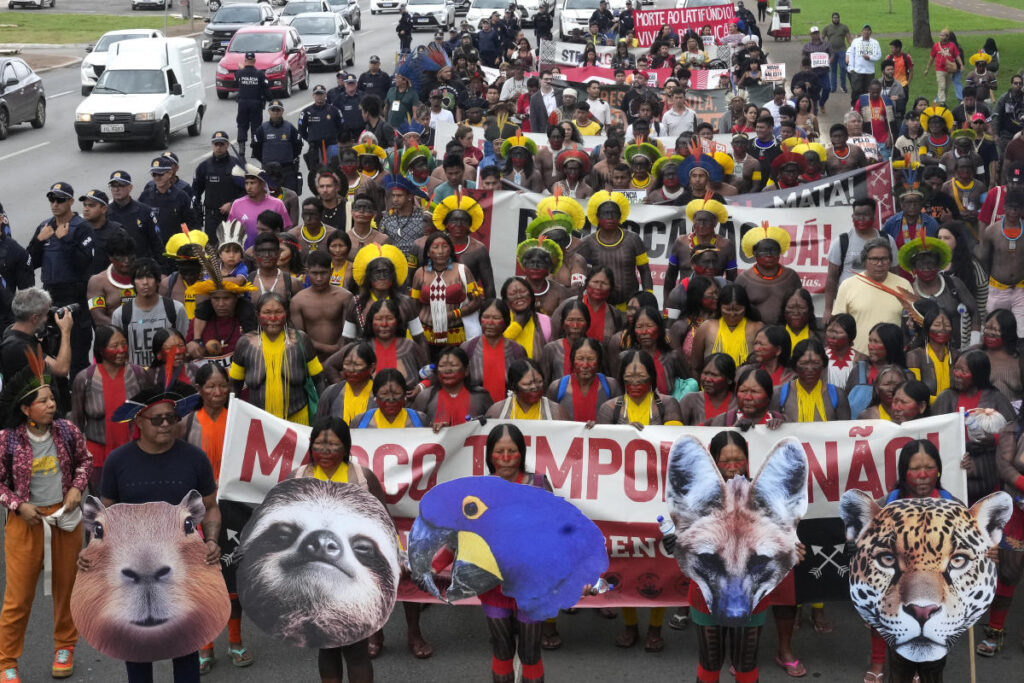On Wednesday in Brasília, Brazil, hundreds of Indigenous people marched in a protest against a proposed constitutional amendment put forth in Congress. This potential legislation seeks to impose a legal deadline related to land claims by Indigenous communities, specifically marking October 5, 1988—the date the Brazilian Constitution was enacted—as the cutoff for any rights to land. The agribusiness caucus, which stands strongly behind this bill, believes that establishing this deadline will enhance legal certainty for landholders. However, Indigenous rights groups have strongly opposed this approach, arguing that it unfairly disregards historical injustices, such as forced displacements and invasions of Indigenous lands, particularly during the significant agricultural expansion in Brazil in the 20th century.
During the demonstration, many Indigenous participants adorned themselves with animal imagery and body paint, representing their connection to their ancestral lands and traditions. Alessandra Korap, a leader from the Munduruku tribe, expressed deep concerns about the implications of the bill, questioning how many lives would be adversely affected if it were to become law. Her sentiments reflect widespread apprehension among Indigenous groups regarding the growing influence of agribusiness and its impact on their territories and rights. Many demonstrators emphasized the vital connection between Indigenous peoples and their lands, urging the government to recognize these links instead of prioritizing industrial and agrarian interests.
Recently, the Brazilian Supreme Court rejected the concept of imposing a deadline on Indigenous land claims, ruling that areas tied to Indigenous ancestry are constitutionally protected, regardless of official recognition. This decision was celebrated by many Indigenous advocates and communities, who viewed it as a crucial victory in their ongoing struggle for land rights. However, the momentum following this ruling quickly shifted; within a week, pro-agribusiness lawmakers began to push for legislative approval of the deadline once again, intensifying fears among Indigenous leaders about their future land rights and the potential for increased conflict.
Supporters of the constitutional amendment, such as Senator Hiran Gonçalves, argue that the measure seeks to bring a definitive settlement to land claims disputes, thereby eliminating ongoing legal uncertainty. Conversely, Indigenous organizations warn that such legislation, if approved, would effectively halt the demarcation of Indigenous lands, escalate environmental conflicts, and contribute to deforestation. These assertions highlight a significant clash of interests between Indigenous rights and commercial agriculture, leading to broader socio-political implications within Brazil.
Amidst this turbulent backdrop, a law was passed in December 2022 that also established the 1988 date as a critical deadline, which has since prompted Indigenous groups and political parties to appeal to the Supreme Court for reconsideration. Nonetheless, the court has yet to issue a ruling on this latest appeal, leaving the Indigenous movement in a state of uncertainty regarding the protection of their lands and rights. As the legislative debate continues, the future of countless Indigenous communities hangs in the balance, with potential consequences that extend beyond land rights to broader environmental and cultural impacts.
As the struggle for recognition and protection of Indigenous lands intensifies, the situation illustrates the broader conflict in Brazil between traditional Indigenous rights and the interests of agribusiness and other commercial sectors. The ongoing protests serve as a reminder of the resilience and determination of Indigenous peoples in the face of policies that threaten their ways of life. The outcome of the proposed constitutional amendment and its implications for Indigenous rights will be closely watched, as it represents not just a legal battle but a moral one about the recognition of history, justice, and the future of the Amazon and its guardians.

